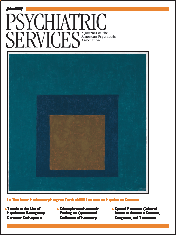Treatment Compliance and Child Custody
To the Editor: In a letter to the editor in the March issue, Joanne Nicholson (1) commented on an article in the January issue by John Monahan and colleagues (2) about the use of therapeutic leverage to improve psychiatric treatment adherence among persons with severe mental illnesses living in the community. Dr. Nicholson, in her thoughtful letter, acknowledged that the public mental health system provides little support for parents with severe mental illnesses. However, she also stated, "The definition of leverage and the focus of research must be broadened to include the threat or actual loss of custody or contact with children." In our view, suggesting the use of child custody as leverage poses significant ethical dilemmas and bypasses important legal doctrine.
Certainly there is a need to improve treatment adherence among some persons with severe mental illnesses, particularly those who frequently cycle through hospital emergency departments and the criminal justice system (3). We concur with the view of Dr. Monahan and his colleagues that therapeutic leverage should entail other mechanisms besides outpatient commitment, which has dominated the literature until recently. However, the loss of custody substantially affects the lives of both the parent and the child and exposes both to a stressful legal process that can be traumatic and that can have enduring effects. The implied threat that treatment noncompliance by a parent may result in temporary or permanent loss of contact between a parent and a child overlooks the importance of the child's bond with the parent and the child's need for continuity and permanency in relationships with the parent. In sum, use of child custody as leverage fails to consider the rights and needs of children.
Unquestionably, in some instances, a child is best served by being removed from a parent suffering from a mental illness if that parent cannot provide a safe and caring environment. However, because the child will inevitably be harmed (although perhaps helped in some ways) by such a drastic measure, the ethical quandary of forfeiting a child's relationship with his or her parent because of the parent's treatment noncompliance can be severe and ignores the fluid nature of most mental illnesses in which active symptoms and moments of insight ebb and flow over the life course. In most U.S. jurisdictions, the "best interests of the child" (4) is the legal standard on which family courts base rulings in child custody matters, which reflects an emphasis on the child's needs. We caution against the adoption of child custody as a routine method of enforcing treatment compliance and worry about its inclusion into a growing array of assertive approaches to induce treatment compliance.
Dr. Steven Erickson is a postdoctoral fellow at the University of Rochester Medical Center and law guardian in the Fourth Judicial Department of New York State. Dr. Patricia Erickson is chair of the department of sociology, anthropology, and criminal justice at Canisius College in Buffalo, New York, and a law guardian in the Fourth Judicial Department of New York State. Ms. Campbell is senior instructor at the University of Rochester Medical Center.
1. Nicholson J: Use of child custody as leverage to improve treatment adherence. Psychiatric Services 56:357–358,2005Link, Google Scholar
2. Monahan J, Redlich AD, Swanson J, et al: Use of leverage to improve adherence to psychiatric treatment in the community. Psychiatric Services 56:37–44,2005Link, Google Scholar
3. Lamberti JS, Weisman RL: Persons with severe mental disorders in the criminal justice system: challenges and opportunities. Psychiatric Quarterly 75:151–164,2004Crossref, Medline, Google Scholar
4. 2 American Jurisprudence, 2d Adoption section 131 (2004)Google Scholar



